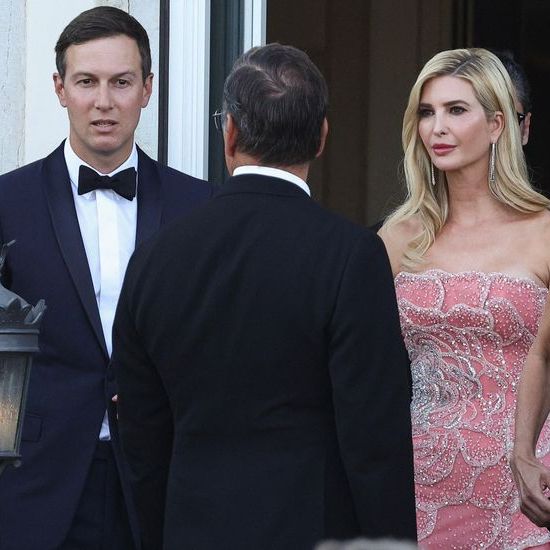Trump hints Kushner may take on new Iran diplomacy role

US President Donald Trump appeared to suggest in a passing remark during a speech before Israel's Knesset on Monday that his son-in-law Jared Kushner could lead US diplomacy with Tehran.

US President Donald Trump appeared to suggest in a passing remark during a speech before Israel's Knesset on Monday that his son-in-law Jared Kushner could lead US diplomacy with Tehran.
“We always bring Jared when we want to get that deal closed … Steve, you and Jared and the general and Pete and Marco — you’ll get that deal done,” Trump said moments after discussing Iran’s nuclear program and its role in the Middle East.
The line was brief but telling.
For analysts who have followed Trump’s unconventional diplomacy, it echoed the playbook that produced the Abraham Accords — a blend of personal trust, transactional bargaining and Kushner’s unique access to Persian Gulf capitals.
Kushner has already hinted at his own views on Iran in the past. In a post on X in September 2024, he called the day Hezbollah leader Hassan Nasrallah’s was assassinated by Israel “the most important day in the Middle East since the Abraham Accords.”
Kushner wrote on X that Iran was “now fully exposed” because its deterrent — Hezbollah’s arsenal — had been “a loaded gun pointed at Israel.”
The billionaire businessman argued that Israel “cannot afford now to not finish the job and completely dismantle the arsenal that has been aimed at them,” and praised Trump’s strategy of strength over negotiation.
The message underscored Kushner’s hawkish outlook on Iran and belief that its armed allies in the region must be dismantled before any lasting peace can emerge.
The Kushner Factor
Eric Mandel, director of the Middle East Political Information Network (MEPIN), told Iran International that Trump’s reliance on loyal envoys like Kushner reflects his governing style — but that Iran is a different arena entirely.
“He uses people who are loyal to him to do things way beyond what normal portfolios are,” Mandel said. “But you’re not going to change the spots of the Islamic Republic.”
Mandel warned that Kushner’s pragmatic, business-minded approach could misread Tehran’s ideological rigidity.
While Mandel sees value in verifiable understandings — such as access for inspectors, curbs on ballistic missile and limits on activity by armed allies — he doubts Tehran would treat such talks as anything more than a tactical pause.
Iran has expressly rejected curbs to its military activities as a non-starter for talks.
“If you can kick the can down the road five years, maybe ten, and get something binding, fine,” he said. “But don’t expect human-rights progress or regime transformation. They’ll stall until Trump is gone," said Mandel.
Trump’s renewed focus on Iran comes amid a regional recalibration. Following Israel’s 12-day war with Iran in June and a fragile Gaza truce, he may be testing whether Tehran’s leadership will engage diplomatically or double down on defiance.
‘The Carrot and the Stick’
Kushner’s re-emergence makes practical sense, as he retains credibility with Riyadh, Abu Dhabi and Doha, and may offer Tehran a face-saving interlocutor outside official channels, Middle East analyst, former Israeli intelligence official and author Avi Melamed told Iran International.
“It makes sense that he could be someone the Iranians would be willing to look at as a go-between,” Melamed said. “He’s a familiar figure in Gulf capitals, and his track record with the Abraham Accords gives him legitimacy others don’t have.”
Kushner has multi-billion dollar business ties with state-linked businesses in the region.
His Affinity Partners investment group partnered with Saudi Arabia's Public Investment Fund to help buy US videogame developer Electronic Arts last month for $55 billion, which if completed would be the largest leveraged buyout in history.
Carrot, stick
Trump’s mention of Kushner also signaled a dual strategy — diplomacy backed by implicit threat, Israeli-Iranian researcher Beni Sabti, who served as former spokesperson to Prime Minister Netanyahu, told Iran International.
“Jared is the carrot, and Israel is the stick,” he said. “Trump shows Iran that there’s a softer route if they behave, but the alternative is pressure and potential strikes.”
Yet others see opportunity rather than confrontation. With Iran under economic strain and its regional proxies weakened, some analysts believe Trump’s overture — and Kushner’s possible return — could open a narrow diplomatic window.
Melamed argued Tehran has reasons to listen. The June 12-day war severely weakened the so-called axis of resistance and exposed Iran’s regional vulnerabilities.
Coupled with new US sanctions and pressure on Iran-backed militias, “the toolkit Washington holds today is far stronger than before October 7,” he said. Melamed expects the clerical establishment to seek talks to ease economic strain while preserving its core power structure.
Sabti said Tehran’s refusal to attend last month’s Sharm el-Sheikh peace summit underscores both its isolation and its pride — a system that, he said, “would rather stay out and look strong than appear subordinate.”
Whether Kushner formally re-enters diplomacy on Iran remains unclear. But Trump’s words revived speculation first reported by Iran International podcast Eye for Iran in 2024, when Yale’s Jeffrey Sonnenfeld — who worked with Kushner on the Abraham Accords — predicted that “the only way there will be peace in the Middle East is through someone like Kushner.”
For now, Iran’s answer is silence.
The Islamic Republic declined an invitation to the Sharm el-Sheikh summit, calling recognition accords with Israel a “treacherous normalization project.”
Still, with sanctions tightening and proxies under strain, analysts agree Tehran may be preparing to reopen diplomatic channels — even if only to buy time.